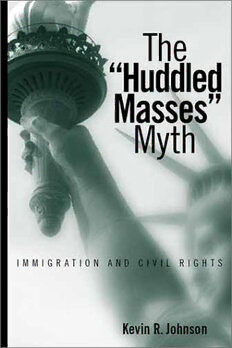
The Huddled Masses Myth: Immigration And Civil Rights PDF
265 Pages·2003·1.041 MB·English
Most books are stored in the elastic cloud where traffic is expensive. For this reason, we have a limit on daily download.
Preview The Huddled Masses Myth: Immigration And Civil Rights
Description:
Despite rhetoric that suggests that the United States opens its doors to virtually anyone who wants to come here, immigration has been restricted since the nation began. In this book, Kevin R. Johnson argues that immigration policy reflects the social hierarchy that prevails in American society as a whole and that immigration reform is intertwined with the struggle for civil rights. The ""Huddled Masses" Myth" focuses on the exclusion of people of color, gays and lesbians, people with disabilities, the poor, political dissidents, and other disfavored groups, showing how bias shapes the law.In the nineteenth century, for example, virulent anti-Asian bias excluded would-be immigrants from China and severely restricted those from Japan. In our own time, people fleeing persecution and poverty in Haiti generally have been treated much differently from those fleeing Cuba. Johnson further argues that although domestic minorities (whether citizens or lawful immigrants) enjoy legal protections and might even be courted by politicians, they are regarded as subordinate groups and suffer discrimination. This book has particular resonance today as the public debates the uncertain status of immigrants from Arab countries and of the Muslim faith. Author note: Kevin R. Johnson is Associate Dean as well as Professor of Law and Chicana/o Studies at The University of California, Davis. His book, "How Did You Get to Be Mexican?: A White/Brown Man's Search for Identity" was published by Temple in 1999.
See more
The list of books you might like
Most books are stored in the elastic cloud where traffic is expensive. For this reason, we have a limit on daily download.
